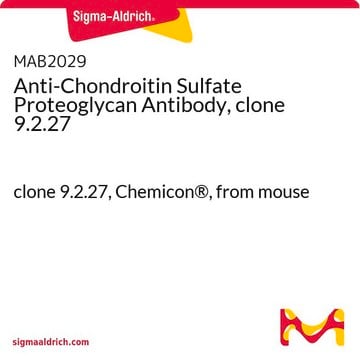MAB2030
Anti-Chondroitin 4 Sulfate Antibody, clone BE-123
ascites fluid, clone BE-123, Chemicon®
Synonym(s):
Anti-CSPG4A, Anti-HMW-MAA, Anti-MCSP, Anti-MCSPG, Anti-MEL-CSPG, Anti-MSK16, Anti-NG2
About This Item
Recommended Products
biological source
mouse
Quality Level
antibody form
ascites fluid
antibody product type
primary antibodies
clone
BE-123, monoclonal
species reactivity
human, canine, rat, sheep, bovine, mouse
manufacturer/tradename
Chemicon®
technique(s)
ELISA: suitable
radioimmunoassay: suitable
western blot: suitable
isotype
IgG1κ
NCBI accession no.
UniProt accession no.
shipped in
dry ice
target post-translational modification
unmodified
Gene Information
human ... CSPG4(1464)
Specificity
Immunogen
Application
RIA at 1:50-1:6,400.
Immunohistochemistry: This antibody only reacts with digested material. Fixed tissue must be digested with chondroitinase ABC (Sigma).
The Reference 23757342 should be indicated for IHC. (Reine, TM., et al., PubMed ID: 23757342)
Western Blot: 1:1000-1:4000 using ECL detection method. Chondroitinase ABC treatment of lysate sample is helpful.
In any alkali buffer, e.g. Tris or acetate (50mM or 100mM) pH 7.4-7.6. Make a stock solution by diluting one vial of Sigma Chondroitinase A, B, C, (5 units/vial) in 100 µL . For use, dilute stock 10-fold into the buffer of choice. Use at a ratio of 50-100mg of proteoglycan per 5 units of enzyme. On fixed cells, dilute in Tris acetate and on non-fixed cellsy dilute 10-25 fold in DMEM.
Poole, C.A., et al., J. Histochem. Cytochem. 1991. 39:1175-1187.
Optimal working dilutions must be determined by the end user.
Cell Structure
ECM Proteins
Physical form
Storage and Stability
Legal Information
Disclaimer
Not finding the right product?
Try our Product Selector Tool.
recommended
Storage Class Code
10 - Combustible liquids
WGK
WGK 1
Flash Point(F)
Not applicable
Flash Point(C)
Not applicable
Certificates of Analysis (COA)
Search for Certificates of Analysis (COA) by entering the products Lot/Batch Number. Lot and Batch Numbers can be found on a product’s label following the words ‘Lot’ or ‘Batch’.
Already Own This Product?
Find documentation for the products that you have recently purchased in the Document Library.
Our team of scientists has experience in all areas of research including Life Science, Material Science, Chemical Synthesis, Chromatography, Analytical and many others.
Contact Technical Service








